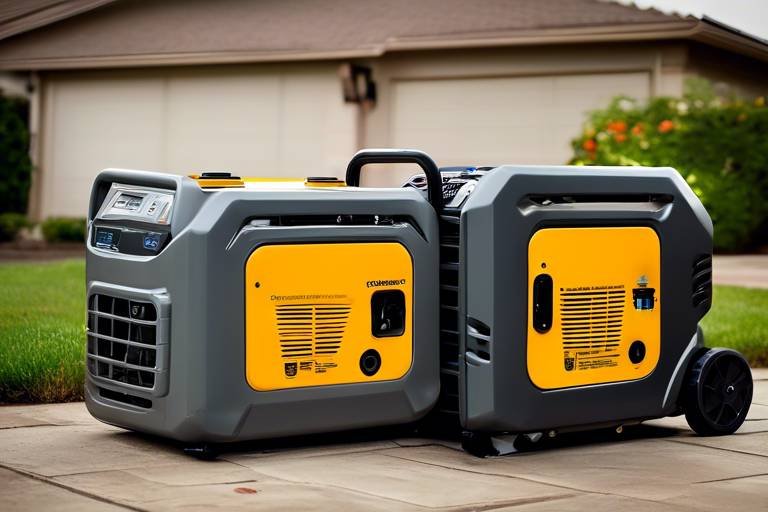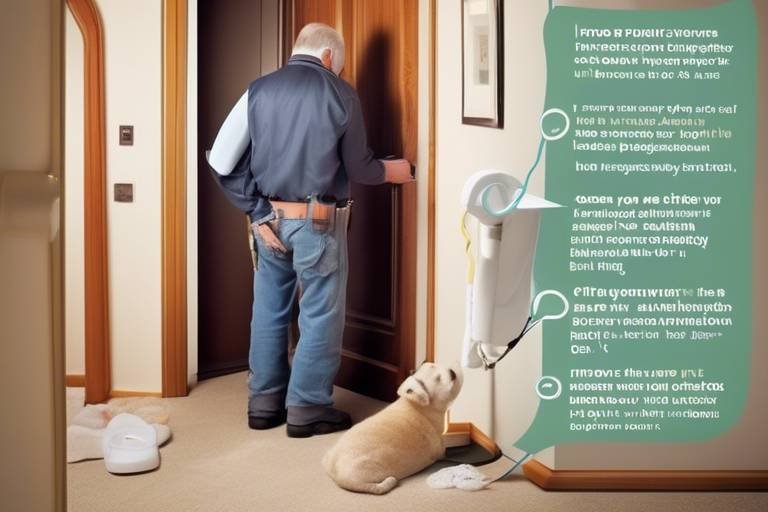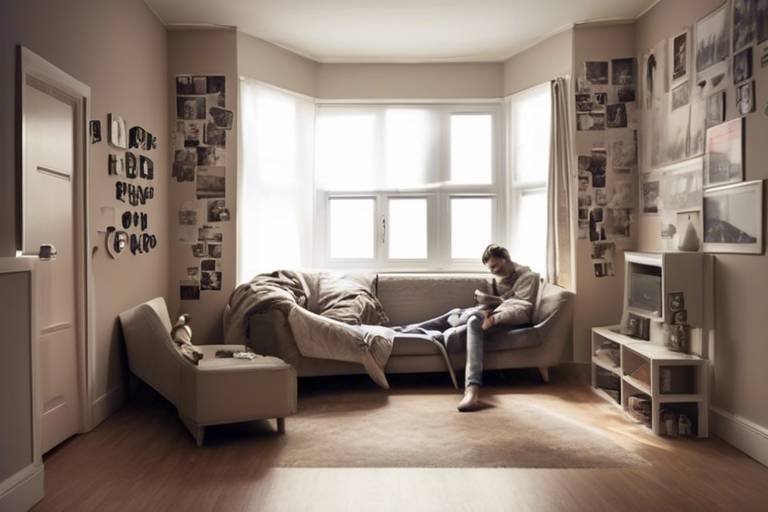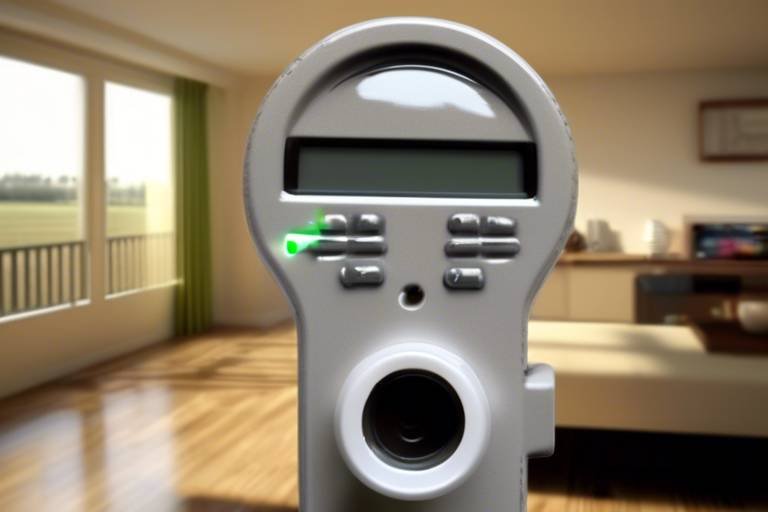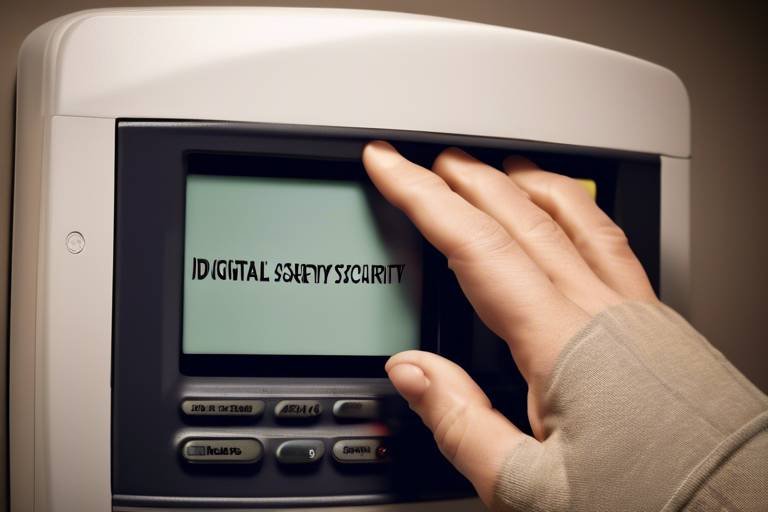DIY Home Security Solutions – Pros and Cons
In today's world, ensuring the safety of your home is more important than ever. With rising crime rates and increasing concerns about personal safety, homeowners are constantly on the lookout for effective ways to protect their properties. One solution that has gained significant traction is DIY home security systems. But what does that really mean? And more importantly, is it the right choice for you? In this article, we will explore the advantages and disadvantages of DIY security systems, providing you with the insights needed to make an informed decision.
DIY home security systems are designed for homeowners who want to take matters into their own hands. Unlike traditional security services that often require professional installation and monitoring, DIY systems allow you to set up your own security measures. This growing trend is particularly appealing to those who seek customizable and cost-effective solutions. With a plethora of options available, homeowners can choose devices and systems that fit their unique needs, from smart cameras to motion detectors, all without the hefty price tag of professional services.
When it comes to DIY security systems, the list of benefits is impressive. For starters, these systems are often affordable, making them accessible to a wider audience. Homeowners can enjoy the peace of mind that comes with having a security system without breaking the bank. Additionally, the flexibility offered by DIY systems is a game-changer. You can install, modify, or upgrade your system at your own pace, ensuring that your security measures evolve with your needs.
One of the primary advantages of DIY security is its affordability. Traditional security services often come with high installation and monthly monitoring fees, which can add up quickly. In contrast, DIY systems allow you to save a significant amount of money. By eliminating the need for professional installation, you can invest in quality devices without the added costs. Imagine being able to secure your home for a fraction of what you would typically pay!
There are numerous budget-friendly DIY security products available on the market today. For instance, you might consider investing in:
- Smart cameras: Affordable options can be found that offer excellent video quality and remote access.
- Motion detectors: These devices can alert you to any unusual activity around your property.
- Smart locks: Upgrade your home’s entry points with locks that you can control from your smartphone.
These options provide reliable security without the hefty price tag often associated with traditional services.
Investing in a DIY system can yield significant long-term savings. By eliminating monthly monitoring fees, homeowners can enjoy the benefits of security without ongoing costs. Over time, these savings can accumulate, allowing you to allocate your budget to other important areas of your home or life. Think of it as a way to invest in your peace of mind while also saving for that dream vacation or home renovation!
Another remarkable feature of DIY security systems is the level of customization and control they offer. Homeowners can design their security setups according to their specific needs and preferences. Whether you want to monitor your home from your smartphone or set up alerts for certain activities, the power is in your hands. This level of control not only empowers you but also ensures that your security measures align perfectly with your lifestyle.
While DIY solutions offer many benefits, they also come with their share of drawbacks. It's essential to weigh these potential challenges before making a decision. One of the most significant concerns is the technical challenges that may arise. Not all homeowners are tech-savvy, and some DIY systems can be complicated to install and maintain. If you encounter issues, you might find yourself in a bind without the help of a professional.
Common technical issues can include connectivity problems, software glitches, or even hardware malfunctions. If you're not comfortable troubleshooting these issues, you may find that your DIY system becomes more of a headache than a help. It's crucial to assess your comfort level with technology before diving into a DIY security setup.
Many DIY systems do not include professional monitoring services, which can be a significant drawback. Relying solely on self-monitored systems means that you are responsible for responding to alerts and notifications. In the event of a break-in or emergency, you may not have the immediate support that a professionally monitored system can provide. This aspect can leave some homeowners feeling vulnerable, especially if they are away from home frequently.
1. Are DIY security systems effective?
Yes, DIY security systems can be highly effective if set up correctly. They offer various devices that can help monitor your home and alert you to potential threats.
2. Do I need technical skills to install a DIY security system?
While some systems are user-friendly, others may require a basic understanding of technology. It's essential to choose a system that matches your comfort level.
3. Can I expand my DIY security system later?
Absolutely! Many DIY systems are designed to be modular, allowing you to add more devices as your needs change.
4. What happens if I experience a technical issue?
Most manufacturers provide customer support, but you may not have the same level of assistance as you would with a professionally installed system.

Understanding DIY Home Security
In today’s world, where safety is a top priority, DIY home security systems have emerged as a popular choice for many homeowners. But what exactly does “DIY” mean in this context? Simply put, DIY home security allows you to set up and manage your own security system without relying on professional installation or monitoring services. This approach gives you the power to choose what works best for your unique situation, making it a highly appealing option for those who value customization and control.
The rise of DIY security solutions can be attributed to several factors. First and foremost, technological advancements have made it easier than ever to install and manage security systems. With user-friendly interfaces and mobile apps, you can monitor your home from anywhere in the world, all from the comfort of your smartphone. Imagine being on vacation and receiving a notification about unusual activity at your front door—now you can check in real-time, giving you peace of mind without the hefty price tag of professional services.
Moreover, the growing availability of affordable security products has democratized home protection. You can find a variety of devices, from smart cameras to motion detectors, that fit any budget. The flexibility of DIY systems means you can start small and gradually expand your setup as your needs change. For instance, you might begin with a simple camera at your front entrance and later add door sensors or smart locks as you see fit. This adaptability is one of the key reasons why many homeowners are turning to DIY solutions.
However, it's important to understand that with great power comes great responsibility. While DIY systems offer many advantages, they also require a certain level of commitment and technical know-how. Homeowners must be willing to invest time in researching products, understanding how to install them, and regularly maintaining the system to ensure optimal performance. In the next sections, we will delve deeper into the pros and cons of these systems, helping you to weigh your options effectively.
In summary, DIY home security systems provide a unique blend of affordability, flexibility, and control. As you consider your options, remember that the right system for you is one that meets your specific needs and lifestyle. Whether you’re a tech-savvy individual or someone just looking to enhance your home’s safety, DIY solutions can be tailored to fit your security requirements.

Advantages of DIY Security Systems
When it comes to protecting your home, DIY security systems are making waves as a popular choice among homeowners. The appeal lies in their myriad advantages that cater to a wide range of needs and preferences. First and foremost, these systems are incredibly affordable, allowing homeowners to invest in security without emptying their wallets. Unlike traditional security services that often come with hefty installation and monitoring fees, DIY options enable you to take control of your security setup without breaking the bank.
One of the most significant benefits is the flexibility that DIY systems provide. Homeowners can choose from a variety of products and customize their security solutions based on their unique requirements. Whether you want to install cameras, motion sensors, or smart locks, the choice is entirely yours. This level of customization means you can design a security system that fits your lifestyle and home layout perfectly.
Let's dive deeper into some of the standout features that make DIY security systems so attractive:
- Cost-Effectiveness: By eliminating the need for professional installation and ongoing monitoring fees, DIY systems allow you to save money in the long run. Imagine investing in a system that pays for itself over time!
- Budget-Friendly Options: There are countless affordable DIY security products available on the market. From basic camera kits to comprehensive alarm systems, you can find reliable options that won’t strain your budget.
- Long-Term Savings: Think about it: without monthly fees, your investment in a DIY system can translate into significant savings. Over the years, those savings can add up, allowing you to allocate funds to other important areas.
Another compelling aspect of DIY security is the control it gives homeowners. You are no longer reliant on a third party to monitor your home; instead, you can manage your security system at your convenience. Want to check your camera feed while on vacation? No problem! With just a few taps on your smartphone, you can keep an eye on your property anytime, anywhere.
Moreover, DIY systems often come with user-friendly apps that make monitoring and managing your security a breeze. You can set alerts, view live feeds, and even control smart devices, all from the palm of your hand. This level of accessibility ensures that you are always in the loop, giving you peace of mind.
In summary, the advantages of DIY security systems are hard to overlook. They are not only cost-effective but also offer a level of customization and control that traditional systems often lack. If you're looking for a solution that allows you to protect your home on your own terms, DIY systems might just be the answer you've been searching for.

Cost-Effectiveness
One of the primary advantages of DIY security systems is their remarkable affordability. When you compare the costs associated with traditional security systems, which often require hefty installation fees and ongoing monitoring charges, DIY options emerge as a breath of fresh air for budget-conscious homeowners. Imagine being able to secure your home without the weight of a monthly bill hanging over your head! This not only allows you to allocate your hard-earned money to other essential areas but also gives you peace of mind knowing that you’re making a smart financial choice.
Let’s break down the cost-effectiveness of DIY security systems. First off, there are no installation fees. Most DIY systems are designed for easy setup, meaning you can install them yourself without needing to hire a professional. This can save you anywhere from $100 to $500 in initial costs. Plus, many DIY systems come with user-friendly manuals or online tutorials that guide you through the installation process, making it accessible even for those who might not consider themselves tech-savvy.
Additionally, consider the ongoing expenses associated with traditional security systems. Many of these services charge monthly monitoring fees that can range from $20 to $60 per month. Over a year, that adds up to a staggering $240 to $720. In contrast, most DIY systems offer self-monitoring options that allow you to keep an eye on your property without incurring these recurring costs. Not only does this provide substantial savings, but it also empowers you to take charge of your home security.
To illustrate the potential savings, let’s look at a simple comparison:
| Cost Component | Traditional Security System | DIY Security System |
|---|---|---|
| Installation Fee | $100 - $500 | $0 (self-install) |
| Monthly Monitoring Fee | $20 - $60 | $0 (self-monitoring) |
| Annual Cost (1 Year) | $240 - $720 | $0 |
As you can see, the financial benefits of choosing a DIY security system are hard to ignore. Not only do you save on installation and monitoring fees, but you also gain the flexibility to upgrade or modify your system as your needs change without incurring extra costs. This adaptability is a significant advantage, especially for families who may move or change their security requirements over time.
In conclusion, the of DIY security systems makes them an attractive option for homeowners looking to protect their properties without breaking the bank. By eliminating installation fees and monthly monitoring costs, DIY solutions allow you to invest in your security without the financial strain often associated with traditional methods. It’s like having your cake and eating it too—affordable security that doesn’t compromise on quality!

Budget-Friendly Options
When it comes to securing your home, you don't have to empty your wallet to achieve peace of mind. There are a plethora of budget-friendly DIY security options available that can provide reliable protection without breaking the bank. These solutions are increasingly popular among homeowners who want to take control of their security without incurring hefty fees associated with traditional systems. Imagine being able to customize your own security setup while keeping your budget intact—sounds appealing, right?
One of the most attractive features of DIY security systems is the variety of affordable products on the market. For example, motion sensor lights, door/window alarms, and even smart cameras can be found at competitive prices. Many of these products can be purchased for under $100, allowing homeowners to build their security system piece by piece. This way, you can invest in what you need most and gradually expand your system as your budget allows.
To give you an idea of what’s available, here’s a quick overview of some popular budget-friendly options:
| Product Type | Price Range | Key Features |
|---|---|---|
| Smart Cameras | $50 - $100 | Live streaming, night vision, motion detection |
| Door/Window Sensors | $20 - $50 | Alerts for unauthorized entry, easy installation |
| Motion Sensor Lights | $30 - $70 | Deters intruders, enhances visibility at night |
| Video Doorbells | $80 - $150 | Two-way audio, remote viewing, package detection |
Additionally, many of these devices can be integrated with your smartphone, giving you the ability to monitor your home from anywhere. This smart technology not only enhances your security but also adds convenience to your daily life. Imagine receiving a notification on your phone when someone approaches your front door or if a window is opened unexpectedly. This level of control is both empowering and reassuring.
In conclusion, opting for budget-friendly DIY security options allows you to tailor your home security to fit your financial situation while still providing effective protection. With numerous products available that combine affordability with advanced features, you can create a security system that meets your unique needs without the burden of high costs.
- What are the most affordable DIY security systems? There are many options available, including smart cameras, door/window sensors, and motion sensor lights, often priced under $100.
- Can I install these systems myself? Absolutely! Most DIY security products are designed for easy installation, requiring no professional help.
- Are DIY security systems effective? Yes, many DIY systems are highly effective and can be customized to suit your specific security needs.
- Do I need a subscription for monitoring? Many DIY systems offer self-monitoring options without monthly fees, but some might provide subscription services for added features.

Long-Term Savings
Investing in a DIY home security system can be a game-changer for homeowners looking to save money in the long run. Unlike traditional security systems that often come with hefty installation fees and monthly monitoring costs, DIY solutions allow you to take control of your security without breaking the bank. Think of it this way: by choosing a DIY approach, you're not just purchasing a product; you're making a smart financial decision that can lead to substantial savings over time.
One of the most significant advantages of DIY security systems is the elimination of ongoing monthly fees. Traditional security services can charge anywhere from $20 to $60 per month for monitoring, which adds up to a staggering amount over the years. For instance, if you were to pay $40 a month for 5 years, that totals:
| Monthly Fee | Duration (Years) | Total Cost |
|---|---|---|
| $40 | 5 | $2,400 |
By investing in a DIY system, you can avoid this recurring cost entirely. Many DIY home security products come with a one-time purchase price that includes everything you need to get started. This means that after your initial investment, you can enjoy peace of mind without worrying about monthly bills. It's like paying for a gym membership upfront instead of being charged every month – you save money and can focus on your goals!
Moreover, many DIY systems are designed to be scalable. This means that as your needs change, you can add more components without the need for a complete overhaul or additional service fees. For example, if you start with a few cameras and decide to expand your system later, you can easily purchase additional cameras or sensors. This flexibility not only enhances your security but also allows you to manage costs effectively.
In addition to avoiding monthly fees, many DIY systems are equipped with features that help you save on energy costs. Smart home integration allows you to control lights, thermostats, and other appliances remotely, which can lead to reduced energy consumption. Imagine being able to turn off lights or adjust your thermostat from your smartphone while you're away – not only does this enhance your home security, but it can also keep your utility bills in check.
Lastly, consider the potential for increased property value. A well-installed DIY security system can be an attractive feature for future buyers. Homes equipped with modern security solutions often sell faster and at higher prices. So, in a way, your DIY investment pays off when it comes time to sell your home.
In summary, the long-term savings associated with DIY home security systems are undeniable. By eliminating monthly fees, providing scalability, and integrating energy-saving features, these systems offer a financially savvy alternative to traditional security services. So, if you're looking to protect your home without draining your wallet, a DIY security system might just be the perfect solution for you!
- What is a DIY home security system? A DIY home security system is a self-installed security solution that allows homeowners to set up and monitor their own security devices without professional assistance.
- Are DIY security systems effective? Yes, many DIY security systems are highly effective and can provide robust protection when properly installed and maintained.
- Do I need to pay for monitoring services with DIY systems? Most DIY systems do not require monthly monitoring fees, but some may offer optional monitoring services for an additional cost.
- Can I customize my DIY security system? Absolutely! One of the main advantages of DIY systems is the ability to customize and expand your setup based on your specific needs.

Customization and Control
When it comes to home security, are key factors that many homeowners prioritize. Unlike traditional security systems that often come with rigid configurations and limited options, DIY security solutions allow individuals to tailor their setups according to their unique needs and preferences. Imagine being able to design a security system that fits your lifestyle like a glove—this is the power of DIY!
With DIY systems, you can choose from a wide range of components, including cameras, motion detectors, and alarms. You can mix and match these elements to create a security network that best suits your home. For instance, if you live in a neighborhood with low crime rates, you might opt for a few strategically placed cameras and a simple alarm system. On the other hand, if you reside in a high-risk area, you might want to go all out with additional sensors and smart home integrations.
Another exciting aspect of DIY security is the ability to control your system remotely. Most modern DIY security products come equipped with smartphone apps that allow you to monitor your home from anywhere in the world. Whether you're at work, on vacation, or simply out for a jog, you can check live feeds from your cameras, receive alerts for unusual activity, and even manage your alarms—all from the palm of your hand. This level of control not only enhances your peace of mind but also empowers you to respond quickly in case of an emergency.
Moreover, customization extends beyond just the physical components of the security system. Many DIY solutions offer a variety of settings that let you adjust the sensitivity of motion detectors, set up specific alert types, and even create schedules for when your system should be active. For example, you might want your cameras to be more sensitive during the night when you're asleep but less so during the day when you're home. This flexibility allows you to balance security with convenience, ensuring that your system works for you rather than against you.
In summary, the offered by DIY home security systems make them a compelling choice for many homeowners. By allowing you to design a system that fits your specific needs and providing you with remote access and adjustable settings, DIY solutions empower you to take charge of your home security like never before. So, why settle for a one-size-fits-all approach when you can create a security setup that’s uniquely yours?
- What are the main benefits of DIY home security systems? DIY systems offer affordability, customization, and control, allowing homeowners to tailor their security to their specific needs.
- Can I install a DIY security system myself? Yes, most DIY security systems are designed for easy installation, often without the need for professional assistance.
- Are DIY security systems reliable? While many DIY systems are reliable, their effectiveness can depend on the quality of the components you choose and how well they are installed.
- What happens if I encounter technical issues? Many DIY systems come with customer support, and there are numerous online resources and communities that can help troubleshoot common problems.

Disadvantages of DIY Security Systems
While DIY home security systems come with a plethora of advantages, they also have their fair share of disadvantages that homeowners should carefully consider before diving into the world of self-monitored security. One of the most significant drawbacks is the potential for technical challenges. Not every homeowner is a tech wizard, and some DIY systems can be quite complex. Imagine trying to set up a high-tech security camera system only to find yourself tangled in wires and confused by the software. It can be frustrating and, at times, overwhelming. For those who aren’t particularly tech-savvy, the installation process may turn into a daunting task rather than a straightforward one. Some common technical issues include connectivity problems, software glitches, and compatibility issues with existing home devices.
Moreover, the lack of professional monitoring can be a significant concern. Many DIY systems operate on a self-monitoring basis, meaning that it’s entirely up to the homeowner to keep an eye on their property. While this might sound empowering, it also comes with risks. In the event of a break-in or emergency, the homeowner may not respond as quickly as a professional monitoring service would. For instance, if your alarm goes off in the middle of the night, will you wake up and check your phone immediately, or will you hit snooze? Without a dedicated team monitoring the system 24/7, there’s a chance that an emergency could go unnoticed for too long.
Additionally, some DIY systems may lack the advanced features that come standard with professionally installed systems. For example, many traditional security services offer features like live video monitoring, immediate emergency response, and integration with local law enforcement. DIY systems, while customizable, may not provide the same level of service. Homeowners might find themselves missing out on critical security features that could enhance their safety. It's essential to weigh these limitations against the benefits when considering a DIY solution.
Finally, let’s not forget about the responsibility factor. With a DIY system, the onus is on the homeowner to maintain and troubleshoot the system. This includes regular updates, battery replacements, and ensuring that all components are functioning correctly. If something goes wrong, it’s the homeowner who has to deal with it, rather than a professional who can step in and handle the situation. This aspect can be particularly challenging for those who travel frequently or have busy lifestyles. The last thing you want to worry about while on vacation is whether your home security system is operating as it should.
In conclusion, while DIY home security systems offer a degree of flexibility and cost savings, they also come with challenges that shouldn’t be overlooked. From technical hurdles to the absence of professional monitoring, it’s crucial for homeowners to evaluate their comfort level with technology and their ability to manage security on their own. So, before you rush into buying that shiny new DIY security kit, take a moment to consider whether you’re truly ready to take on the responsibility of protecting your home.
- What are the main disadvantages of DIY security systems?
The main disadvantages include technical challenges, lack of professional monitoring, potential missing features, and the responsibility of system maintenance falling on the homeowner.
- Can I still get help with a DIY security system?
Yes, many manufacturers offer customer support, online resources, and community forums to assist users with their DIY systems.
- Are DIY security systems effective?
Yes, they can be effective, but the effectiveness often depends on the homeowner's ability to properly install and maintain the system.

Technical Challenges
While DIY home security systems can be incredibly appealing, they come with their fair share of that can leave homeowners scratching their heads. Not every homeowner is a tech wizard, and for those who find themselves less than comfortable with gadgets and gizmos, setting up a DIY security system can feel like trying to solve a Rubik's Cube blindfolded. Imagine trying to connect various sensors, cameras, and alarms, only to realize that the instructions are in a language you don’t speak!
One of the most common hurdles is the installation process. While many products claim to be user-friendly, the reality can be quite different. Homeowners may face issues such as:
- Compatibility Problems: Not all devices work seamlessly together. You might find that your shiny new camera doesn’t sync up with your existing alarm system, leading to frustration and wasted money.
- Wi-Fi Connectivity: Many systems rely on a stable internet connection. If your Wi-Fi is spotty, your security system could be compromised, leaving you vulnerable.
- Software Glitches: Like any tech product, DIY systems can suffer from bugs and glitches. A software update might render your system temporarily unusable, which is the last thing you want when it comes to home security.
Furthermore, troubleshooting these issues can be daunting. Homeowners often find themselves sifting through online forums or customer service lines for help, which can be time-consuming and frustrating. Unlike professional systems, where technicians are just a phone call away, DIY systems often leave users to fend for themselves.
Maintenance is another area where technical challenges can arise. Regular updates, battery replacements, and software upgrades are essential to keep a DIY system running smoothly. However, many homeowners may forget these tasks or not know how to perform them, leading to potential security vulnerabilities. It’s a bit like owning a car; if you don’t keep up with the oil changes and tire rotations, you risk breaking down when you least expect it.
In conclusion, while DIY home security systems offer a level of freedom and customization that many homeowners crave, it’s crucial to weigh these against the potential benefits. If you’re not comfortable navigating the tech landscape, you might find that the DIY route isn’t as straightforward as it seems.
- What should I do if I encounter issues during installation? Consider reaching out to customer support for the product you purchased. Many companies offer online resources, including video tutorials, that can help you troubleshoot.
- Are DIY systems as effective as professionally monitored systems? While they can be effective, DIY systems often lack the immediate response that comes with professional monitoring. It's essential to evaluate your security needs before deciding.
- How often should I update my DIY system? Regular updates are crucial for maintaining security. Check for software updates at least once a month and replace batteries as needed.

Lack of Professional Monitoring
When it comes to home security, one of the major trade-offs of opting for a DIY security system is the absence of professional monitoring. Unlike traditional security services that provide 24/7 monitoring by trained professionals, most DIY systems rely on homeowners to monitor their own security. This means that if an alarm goes off in the middle of the night, it’s up to you to decide whether to call the police or simply hit snooze and go back to sleep. Sounds a bit daunting, right?
Imagine this scenario: you’re away on vacation, and a motion detector triggers an alarm at your home. With a professional service, they would immediately assess the situation and notify authorities if necessary. However, with a DIY system, you might receive a notification on your smartphone, but what if you’re in an area with poor cell service? Or worse, what if you’re in a different time zone and don’t see the alert until it’s too late? The peace of mind that comes from knowing a professional is watching over your home can be invaluable.
Let’s break down some of the risks associated with lacking professional monitoring:
- Delayed Response: Without a professional team on standby, your response time to potential threats could be significantly delayed.
- False Alarms: If you’re not vigilant, you might trigger false alarms, which can lead to unnecessary stress and even fines from local authorities.
- Limited Support: DIY systems often come with limited customer support, meaning if something goes wrong, you may be left to troubleshoot on your own.
Furthermore, while many DIY systems offer mobile apps that allow you to monitor your home remotely, they often lack the comprehensive features that professional systems provide. For instance, professional monitoring services can offer:
| Feature | DIY Systems | Professional Monitoring |
|---|---|---|
| 24/7 Monitoring | No | Yes |
| Immediate Emergency Response | No | Yes |
| Expert Consultation | Limited | Yes |
| Automatic System Updates | Varies | Yes |
As you can see, the lack of professional monitoring can result in a higher level of risk for homeowners who choose to go the DIY route. While it’s true that DIY systems can be a great way to save money and customize your security setup, it’s essential to weigh these benefits against the potential vulnerabilities that come with self-monitoring. In the end, it all boils down to how much control you want over your home security and whether you’re prepared to take on that responsibility.
- Can I add professional monitoring to my DIY system later? Yes, many DIY systems allow you to integrate professional monitoring services at a later stage.
- What happens if my internet goes down? Most DIY systems will continue to function, but you may lose remote access until your internet is restored.
- Are DIY security systems effective? Yes, they can be effective if properly installed and monitored, but they require active participation from the homeowner.
Frequently Asked Questions
- What are DIY home security systems?
DIY home security systems are self-installed security solutions that allow homeowners to monitor and protect their properties without the need for professional installation. They are often customizable and can be tailored to fit individual needs and preferences.
- What are the main advantages of DIY security systems?
Some key advantages of DIY security systems include affordability, flexibility, and ease of installation. Homeowners can save money on installation and monitoring fees while having the freedom to customize their security setups according to their specific requirements.
- Are DIY security systems cost-effective?
Absolutely! DIY security systems can lead to significant savings by eliminating monthly fees associated with traditional security services. Plus, there are many budget-friendly options available that don’t compromise on reliability.
- Can I customize my DIY security system?
Yes! One of the best features of DIY security systems is their ability to be tailored to your specific needs. Whether you want to add cameras, motion sensors, or smart home integration, you have full control over your security setup.
- What are the disadvantages of DIY security systems?
While DIY security systems have many benefits, they also come with some drawbacks. Common challenges include technical difficulties during installation and maintenance, as well as the lack of professional monitoring, which can be a concern for some homeowners.
- Do I need technical skills to install a DIY security system?
Not necessarily, but some systems can be more complex than others. If you're not particularly tech-savvy, it might take a little time to get the hang of it. However, many DIY systems are designed to be user-friendly and come with detailed instructions.
- Is professional monitoring necessary for DIY security?
While professional monitoring can provide an extra layer of security, many DIY systems rely on self-monitoring. This means you'll be responsible for monitoring your system and responding to alerts, which may not be ideal for everyone.


